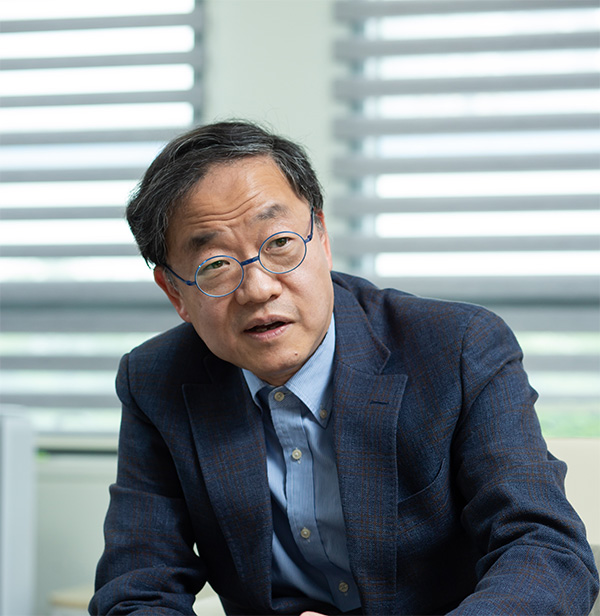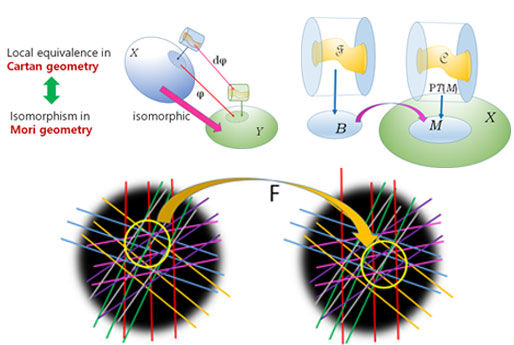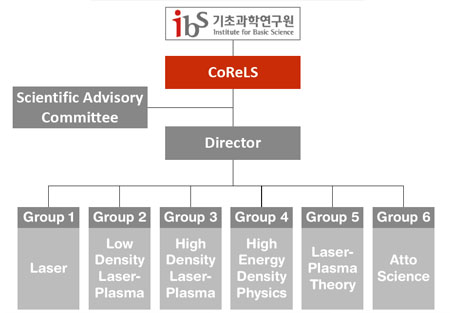주메뉴
- About IBS 연구원소개
-
Research Centers
연구단소개
- Research Outcomes
- Mathematics
- Physics
- Center for Underground Physics
- Center for Theoretical Physics of the Universe (Particle Theory and Cosmology Group)
- Center for Theoretical Physics of the Universe (Cosmology, Gravity and Astroparticle Physics Group)
- Dark Matter Axion Group
- Center for Artificial Low Dimensional Electronic Systems
- Center for Theoretical Physics of Complex Systems
- Center for Quantum Nanoscience
- Center for Exotic Nuclear Studies
- Center for Van der Waals Quantum Solids
- Center for Relativistic Laser Science
- Chemistry
- Life Sciences
- Earth Science
- Interdisciplinary
- Center for Neuroscience Imaging Research (Neuro Technology Group)
- Center for Neuroscience Imaging Research (Cognitive and Computational Neuroscience Group)
- Center for Algorithmic and Robotized Synthesis
- Center for Nanomedicine
- Center for Biomolecular and Cellular Structure
- Center for 2D Quantum Heterostructures
- Institutes
- Korea Virus Research Institute
- News Center 뉴스 센터
- Career 인재초빙
- Living in Korea IBS School-UST
- IBS School 윤리경영


주메뉴
- About IBS
-
Research Centers
- Research Outcomes
- Mathematics
- Physics
- Center for Underground Physics
- Center for Theoretical Physics of the Universe (Particle Theory and Cosmology Group)
- Center for Theoretical Physics of the Universe (Cosmology, Gravity and Astroparticle Physics Group)
- Dark Matter Axion Group
- Center for Artificial Low Dimensional Electronic Systems
- Center for Theoretical Physics of Complex Systems
- Center for Quantum Nanoscience
- Center for Exotic Nuclear Studies
- Center for Van der Waals Quantum Solids
- Center for Relativistic Laser Science
- Chemistry
- Life Sciences
- Earth Science
- Interdisciplinary
- Center for Neuroscience Imaging Research (Neuro Technology Group)
- Center for Neuroscience Imaging Research (Cognitive and Computational Neuroscience Group)
- Center for Algorithmic and Robotized Synthesis
- Center for Nanomedicine
- Center for Biomolecular and Cellular Structure
- Center for 2D Quantum Heterostructures
- Institutes
- Korea Virus Research Institute
- News Center
- Career
- Living in Korea
- IBS School
Research Centers
- Research Outcomes
- Mathematics
- Physics
- Center for Underground Physics
- Center for Theoretical Physics of the Universe (Particle Theory and Cosmology Group)
- Center for Theoretical Physics of the Universe (Cosmology, Gravity and Astroparticle Physics Group)
- Dark Matter Axion Group
- Center for Artificial Low Dimensional Electronic Systems
- Center for Theoretical Physics of Complex Systems
- Center for Quantum Nanoscience
- Center for Exotic Nuclear Studies
- Center for Van der Waals Quantum Solids
- Center for Relativistic Laser Science
- Chemistry
- Life Sciences
- Earth Science
- Interdisciplinary
- Center for Neuroscience Imaging Research (Neuro Technology Group)
- Center for Neuroscience Imaging Research (Cognitive and Computational Neuroscience Group)
- Center for Algorithmic and Robotized Synthesis
- Center for Nanomedicine
- Center for Biomolecular and Cellular Structure
- Center for 2D Quantum Heterostructures
- Institutes
- Korea Virus Research Institute
Attacking challenging problems through geometry over complex numbers
Tel. +82-42-878-8180
IBS Center for Complex Geometry,
B275, 55 Expo-ro, Doryong-dong,
Yuseong-gu, Daejeon (34126), South Korea
Major Publications
- - An application of Cartan’s equivalence method to Hirschowtiz’s conjecture on the formal principle
- - Webs of Lagrangian tori in projective symplectic manifolds
- - Classification of non-degenerate projective varieties with non-zero prolongation and application to target rigidity
- - Base manifolds for fibrations of projective irreducible symplectic manifolds
Director

Director HWANG Jun Muk
Dr. HWANG is the director of the Center for Complex Geometry, established in September 2020.
Dr. HWANG had B.A. in 1986 from Physics department of Seoul National University and Ph. D. in 1993 from Mathematics department of Harvard University. He had worked in University of Notre Dame and Seoul National University before becoming a professor at Korea Institute for Advanced Study in 1999. He was awarded Korea Science Prize in 2001 and Ho-Am Prize in 2009.
Introduction

Attacking challenging problems on systems of polynomial equations and differential equations by fusing ideas and tools from algebraic geometry, differential geometry and complex analysis of several variables.
- - Developing methods of differential geometry to study problems in algebraic geometry.
- - Attacking old unsolved problems and proposing new problems in the intersection of algebra and analysis over complex numbers.
- - Studying symmetries and invariants of systems of differential equations over complex numbers.
Main research activities
Since its emergence as one of the core areas of mathematics in early 19th century, the development of complex analysis has been intricately related to geometry. In the 20th century, the development of complex analysis of several variables intensified its interaction with algebraic geometry and differential geometry. Nowadays it is often hard to distinguish whether a problem or a method in this area belongs to algebraic geometry, differential geometry or complex analysis of several variables. The fusion of these areas of algebra, geometry and analysis over complex numbers is Complex Geometry.
The research at IBS Center for Complex Geometry is centered around the interaction of algebraic geometry and differential geometry. This interaction is much more natural and transparent when we work with complex numbers than real numbers. We aim to develop novel methodology to attack challenging problems on systems of polynomial equations and differential equations. The geometric nature of systems of equations is reflected in their symmetries and invariants so that the main techniques we employ involve Lie theory as well.
At Center for Complex Geometry, mathematicians from these diverse areas interact to learn different ideas from one another and collaborate to develop new methods to attack unsolved problems in mathematics.
Organization

Main research results
- 1.5 PW Laser Beamline 4PW improves performance - Extreme laser field attainmnet
(Optics Express, 2019) - Propose a powerful gamma-ray generation mechanism by non-linear compton scattering at targets with critical and solid densities
(New. J Phys, 2019) - Discovery of polarized radiation generated by a violent field phenomenon
(Nature Photonics, 2018) - Development of OPCPA amplifier; changeable spectrum
(Optics Express, 2018) - Resolving Multiple Molcular Orbitals Using Two-Dimensional High-Harmonic Spectroscopy
(Physical Review Letters , 2015) - Transition of Proton Energy Scaling Using an Ultrathin Target Irradiated by Linearly Polarized Femtosecond Laser Pulses
(Physical Review Letters, 2013) - Enhancement of Electron Energy to the Multi-Gev Regime by a Dual-Stage Laser-Wakefield Accelerator Pumped by Petawatt Laser
(Physical Review Letters, 2013)
Personnel
| Total | 71 |
|---|---|
| Gender | 64(Male), 7(Female) |
| Korean/ International | 64(Korean), 7(International) |
Degree
Position
As of October. 2019
- Content Manager
- Integrated Administrative Team 1 : Kim, Young Eun 042-878-8180
- Last Update 2025-05-14 10:41











